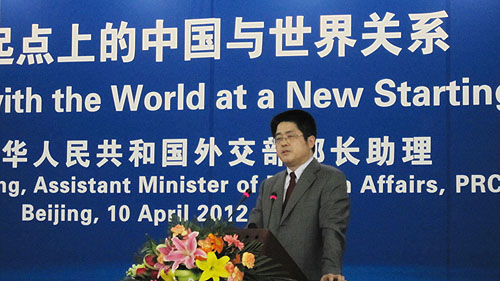|
 |
|
NEW STARTING: Assistant Foreign Minister Le Yucheng delivers a speech at a forum held by the China Institute of International Studies on April 10 in Beijing (YU LINTAO) |
"Emerging countries are not trouble-makers, and their rise is not a challenge," said Le Yucheng, Assistant Foreign Minister at a forum held by China Institute of International Studies on April 10 in Beijing.
"Some countries see emerging countries as monsters or a threat to international security alongside terrorism, nuclear proliferation and natural disasters," said Le. "This view is misguided and unfair."
Today, nobody can deny that the recovery and growth of the world economy now depends, to a large extent, on emerging economies, Le added.
Le said the rise of emerging countries is an important contribution and a rare opportunity to the world. Other countries should make use of it and partner with emerging countries to promote development and stability in the world.
In an era of globalization, countries are increasingly interdependent. Linked by visible and invisible webs such as Internet, the world is shrinking into a "global village." The Internet connects four billion of world's population and 50 billion electronic devices.
"Never before have countries seen their interests are so entwined and their destinies so closely ties. In this networked world of myriad challenges, win-win cooperation is not a choice but the choice," said the assistant foreign minister. "We must stop playing the zero-sum game which builds one's gain on other's loss. Instead, countries must develop a new type of relationship that keeps up with the changes of our time."
On handling relations between major countries, Le claimed that major powers should not repeat the history of maximizing one's own interests, vying for a sphere of influence, conducting the arms race or competing viciously in a zero-sum game.
Le agreed to the point made by U.S. Secretary of State Hillary Clinton that we need to "Find a new answer to the ancient question of what happens when an established power and a rising power meet."
"I think we already have the answer: win-win cooperation, which should be the hallmark of the new pattern of interaction between major countries," said Le.
"The Sino-U.S. relationship is a good example in this context. In the 21 century, the only choice for the two countries is to accommodate each other and carry out win-win cooperation," Le added.
| 